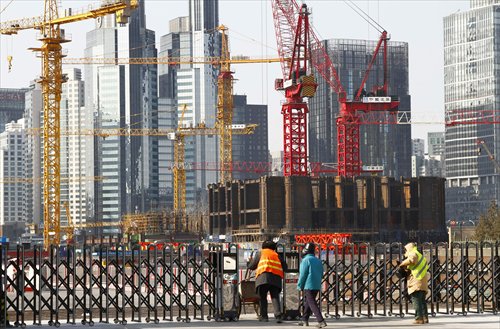Making progress
Experts react to China’s economic reform program
Editor's Note:
Ramped-up economic reforms discussed during the ongoing annual legislative and political consultative sessions have attracted attention from around the world. A flurry of measures - including financial liberalization, SOE reform and the "One Belt and One Road" initiative - have been analyzed by numerous experts. The Global Times presents comments on these issues from four nonresident senior foreign research fellows at the Chongyang Institute for Financial Studies under the Renmin University of China.

Chinese workers enter a construction site in Beijing on January 28. Photo: IC
Antonio Villafranca

Antonio Villafranca
China will consolidate its role as the world's economic engine.Antonio Villafranca is senior research fellow and head of the European Program at the Italian Institute for International Political Studies. Changes to China's economic growth model and the adoption of economic policies facilitating innovation-led growth will help China to adapt to lower economic growth rates in the years ahead.
The reform of China's State-owned enterprises is a crucial step in reshaping the economy, but just heading toward mixed ownership will not be enough - corporate governance and management systems must also be developed.
A further issue is financial liberalization. The China (Shanghai) Pilot Free Trade Zone is a useful step toward a new financial system, but the central government should push for more financial reform.
It is important to bear in mind that China's economic reforms are intended to produce long-term and sustainable results, and therefore their effects might not immediately become visible.
If China wants to meet its short-term growth targets, the country will have to raise domestic consumption and continue providing an attractive environment for foreign investors.
In this area, communications infrastructure may be an issue for Chinese and overseas enterprises.
In the next few years China will consolidate its role as the world's economic engine. We can foresee Chin becoming a multi-centric country, in which inner provinces might contribute to more balanced growth.
Melissa H. Conley Tyler

Melissa H. Conley Tyler
The scale of China's reform program would defeat most countries.
Melissa H. Conley Tyler is the national executive director of the Australian Institute of International Affairs.
China is currently undertaking a hugely ambitious reform program, the scale of which would defeat most countries. This is a sensible reaction to the "new normal" of a slowing rate of growth.It is not possible for China to maintain its historic levels of growth. As it moves into a middle income range, growth will necessarily slow.
The key for China is to avoid the "middle-income trap," in which it becomes hard to move beyond a certain income level. To do so, it needs to build the systems and habits of good governance and the rule of law.
The "One Belt and One Road" initiative is a logical policy to improve economic and political links. I have visited Kunming, capital of Southwest China's Yunnan Province, and understand the potential for the initiative to create economic corridors for the development of China's western regions.
In an interconnected world, all countries have a stake in China's success in managing its economic challenges.
Australia has benefited hugely from Chinese demand for Australian resources.
Australian policymakers are aware that the mining boom is over and that Australia's economy will need to adjust. In this context, the China-Australia free trade agreement is very welcome.
As well as providing greater access for agricultural products, it opens up opportunities for Australian companies in finance, insurance, health, elder care, architecture and other services. This will be to the mutual benefit of China and Australia as they both seek to adjust their economies.
Zhenis Kembayev

Zhenis Kembayev
China's economic reforms have won wide popularity.
Zhenis Kembayev is a professor at the KIMEP University in Almaty, Kazakhstan. An ambitious and far-reaching economic reform agenda is gradually being implemented in China. The reforms were unveiled at the Third Plenum of the 18th Communist Party of China Central Committee in 2013 and are a vital part of what is known now as the "new normal" of the Chinese economy.
Under the "new normal," China's leadership has said the economy should transition from high-speed growth to medium-to-high-speed growth. The economy should also be converted from a model based on investment to one based on innovation.
Signs of the "new normal" have already emerged. In the first half of 2014, the growth rate of the services sector surpassed that of the manufacturing industry, a significant change in structural adjustment and transformation. Among the top 10 in the most recent China rich list released by Hurun, five people were from the IT industry, and the richest was no longer from the real estate sector.
Among the new reforms, a special role belongs to the "One Belt and One Road" initiative.
The "One Belt and One Road" initiative is different from the Marshall Plan, and it does not seek to pursue Chinese hegemony in Asia. Instead, by helping other countries develop, China hopes to achieve a "win-win" situation between it and its partners.
Another difference is that the initiative is open to all countries regardless of their political regimes and willingness to conduct Western-style democratic reforms. China seems to understand the key desire of many developing countries: They want development first.
China's economic reforms have won wide popularity in both China and abroad as they underscore the importance of development and win-win cooperation.
Andreas Freytag

Andreas Freytag
It's good for China to focus on reforms rather than stimulus.Andreas Freytag is a senior fellow of the European Center for International Political Economy and a professor of economics at the Friedrich-Schiller-University Jena in Germany.
The "new normal" theory is absolutely crucial for China's economy, since it must be taken into consideration that growth rates decline over time.
The longer the growth period has been, the lower the growth rates will become, since it is always easier to catch up and learn than to operate at the frontier. This is an experience that many countries - including Germany - have been through.
It is also good that the Chinese government has said it will focus on reforms rather than stimulus. The latter can only work in the short term and in case of a recession.
As for reforms, openness to trade and investment is crucial for long-term success. Although the situation has improved, foreign investors still complain about being treated differently.
Another issue - as already indicated in many instances by the authorities - is the environment. After a period of fast and inclusive growth, a focus on environmental problems is inevitable.
Finally, history has also shown that sustainable economic growth must be combined with the improvement of the political environment. I see China on a good path with this issue.
I am quite optimistic that China will take the necessary steps to allow long-term material improvements for its population.